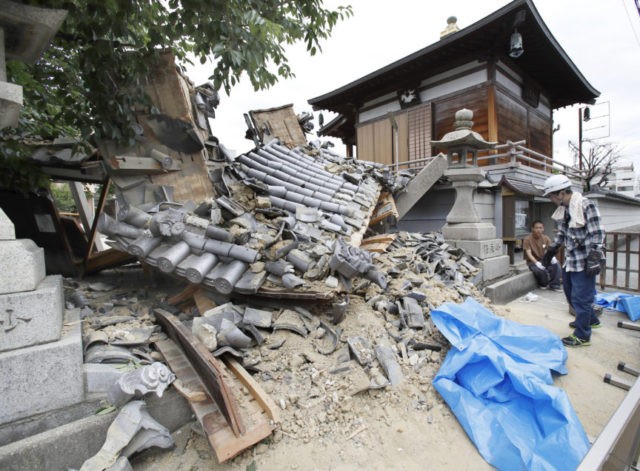At least three people have died and dozens more were injured after an earthquake hit the city of Osaka in Western Japan on Monday morning, local officials have confirmed.
The magnitude 6.1 earthquake struck Osaka, Japan’s second-biggest city, at around 8 a.m. local time. A nine-year-old girl and an elderly man were both killed by collapsing walls, while another man died after being trapped under his bookcase.
This 5,9M earthquake quite scary and makes panic especially when youre still sleeping. #osaka #kyoto #nara #earthquake #japan #Gempa pic.twitter.com/2PhbflQbhh
— Dee (@aulaityuri) June 17, 2018
Japan’s Fire and Disaster Management Agency confirmed that 307 people were also being treated for injuries at local hospitals, although none are believed to be life-threatening. The agency has not issued a tsunami warning but claimed that rain and landslides could pose a danger in the coming days.
“Unless it’s absolutely necessary, everyone should avoid entering dangerous areas and take precautions to ensure your own personal safety,” meteorological agency official Toshiyuki Matsumori told Japanese broadcaster NHK.
According to the Japan Times, around 170,000 homes were left without power while around 100,000 also lost all gas supplies. Local airports and train stations were closed for several hours, while factories were also forced to halt production.
CNN also notes that “several roads suffered severe damage and water pipes burst, sending water flowing onto streets in Takatsuki city where the biggest shock was felt.”
“The earthquake woke me up,” research scientist Atsushi Yokoi told the BBC. “It felt like strong sideways shaking and lasted about five seconds, and I stayed there until it stopped.”
“Though most public transport was still paralysed, buses were working,” he continued. “All the experiments planned have bee canceled and postponed until we are absolutely sure that there’s no risk of an aftershock.”
Japanese Prime Minister Shinzo Abe promised to act decisively to reduce the impact of the earthquake.
“The government will act as one to deal with this earthquake in Osaka, making human life the top priority,” Abe said. “The first step is moving quickly to bring damage under control.”
Japan is situated in one of the world’s most earthquake-prone areas and accounts for around 20 percent of quakes worldwide of magnitude 6.0 or above.
In March 2011, the country was subject to a 9.0 quake that caused a massive tsunami and killing around 18,000 people. The tsunami also triggered the worst nuclear disaster in a quarter of a century at Tokyo Electric Power’s Fukushima Daiichi nuclear plant.
Since that tragedy, Japan has bolstered its already strict rules on building’s earthquake resistance, making it possibly the most prepared country in the world for the effects of natural disasters.
Follow Ben Kew on Facebook, Twitter at @ben_kew, or email him at bkew@breitbart.com.

COMMENTS
Please let us know if you're having issues with commenting.